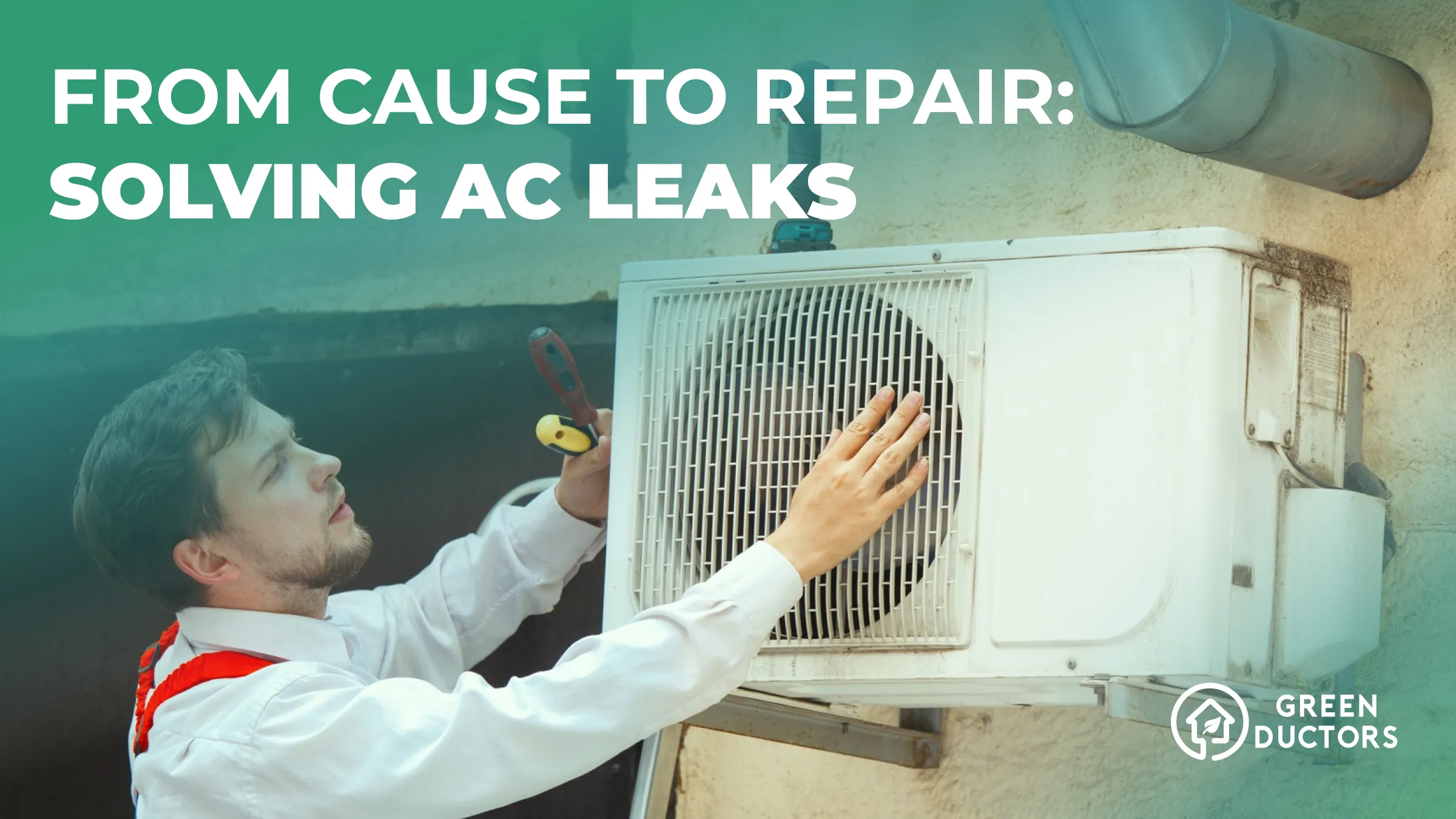It’s a hot summer and your AC has been working overtime. Then, out of nowhere, you see water coming from your air conditioner and start to panic. But have no fear, our trusty team is here to help break down the potential causes of an air conditioner leaking water inside.

AC Leaks: Everything You Need to Know to Keep Your System Running Efficiently
First, let’s take a look at the basics, air conditioners produce condensation as a byproduct of cooling. To break it down even further, most modern air conditioners work by sending air over the evaporator coil to cool, and as the warm air blows over the coil, condensation forms, So seeing a small amount of water from the unit is completely normal, but always keep an eye on the unit, as having an AC unit leaking water from condensation when the unit isn’t operating is a red flag.
Despite leaks being more prevalent in the summer due to the hot humid weather, water leaking from an AC unit isn’t necessarily dangerous to those inside the home. However, it can be dangerous to the home itself if not taken care of promptly as water damage and mold can set in rather quickly.
We would also like to mention that an AC leaking water most often indicates a mechanical problem that’s typically associated with a lack of maintenance. We believe that prevention is the best way to avoid a leaky system, and we advise having a professional inspection twice a year (once in the spring before cooling season, and once in the fall before heating season) to help detect and treat problems before (or as) they arise.
Steps to Take When Your AC is Leaking
When you detect that your AC is leaking, these are the first steps you should take:
- Stop using the air conditioner
Yes, it may be tempting to leave the system on, especially on a hot summer day, but all you will be doing is exasperating the problem, and potentially damaging the unit even further.
- Clean up the water
It seems obvious, but this step often gets ignored. It’s important to clean up the water in order to prevent damage, whether it be to the surrounding parts of the system, electrical components nearby, or to deter the formation of mold–which can set in surprisingly quickly.
- Figure out the cause of the leak
Inspect all surrounding areas and parts of the unit to try and determine the culprit. Some issues can be resolved rather simply, while others may require professional help. And of course, if you can’t determine the problem at hand, give the professionals a call at (888)334-1612
Common Causes of AC Leaks in New York and New Jersey
Below you will find some of the most common reasons why your air conditioner is leaking water:
- A dirty air filter
When the air filter becomes dirty, it in turn restricts airflow, which can lead to increased condensation and water leakage. So sometimes, there’s no need to wonder “Why is my AC leaking” for long, as the fix can be as simple as swapping your old filter for a new one.
- A clogged or damaged drain pipe or pan
If the pipe line is clogged, water can back up and eventually overflow, and if any parts are cracked or damaged, water can seep through them. When it comes to drain pans (or frankly any other parts of the unit) they start to wear out with years of use.
- Low refrigerant levels
Typically if your AC starts making weird noises, it may be worth it to take a look at the refrigerant levels. Low refrigerant levels can cause the evaporator coils to become too cold and freeze, which will ultimately have the air conditioner dripping water, as there’s an overflow in the drain pan upon thawing.
- Frozen evaporator coils
This point goes hand in hand with the one above it. Typically if the coils are frozen, it’s because of low refrigerant levels, but coils can also cause issues if they’re dirty or if there’s restricted airflow.
- A Broken Condensate Pump
In some units, a condensate pump is installed above the main unit and it’s used to help drain out excess water, so when it stops working, the drain pan tends to overfill, which leads to the AC leaking.
- Poor AC Installation
Last but not least, improper installation could be at fault. If the selected AC unit is too small for the space, it can struggle to maintain the proper temperature and work harder than it needs to. Plus, there could be nuances in the actual installation. For example, if the drain pipe is higher than the main unit, water can flow back into the unit and lead to leaks.
Choosing the Right AC Leak Repair Services in New York and New Jersey
So when it comes to the AC leaking water, keeping calm is most important. And even more important, is regular maintenance service so you aren’t stuck between a rock and a hand place when the warm weather hits. Feel free to reach out to our team at Green Ductors for inspections, maintenance, and cleaning. We’ll be happy to help! You can reach us by calling (888) 334-1612 or by filling out the form on the website.

